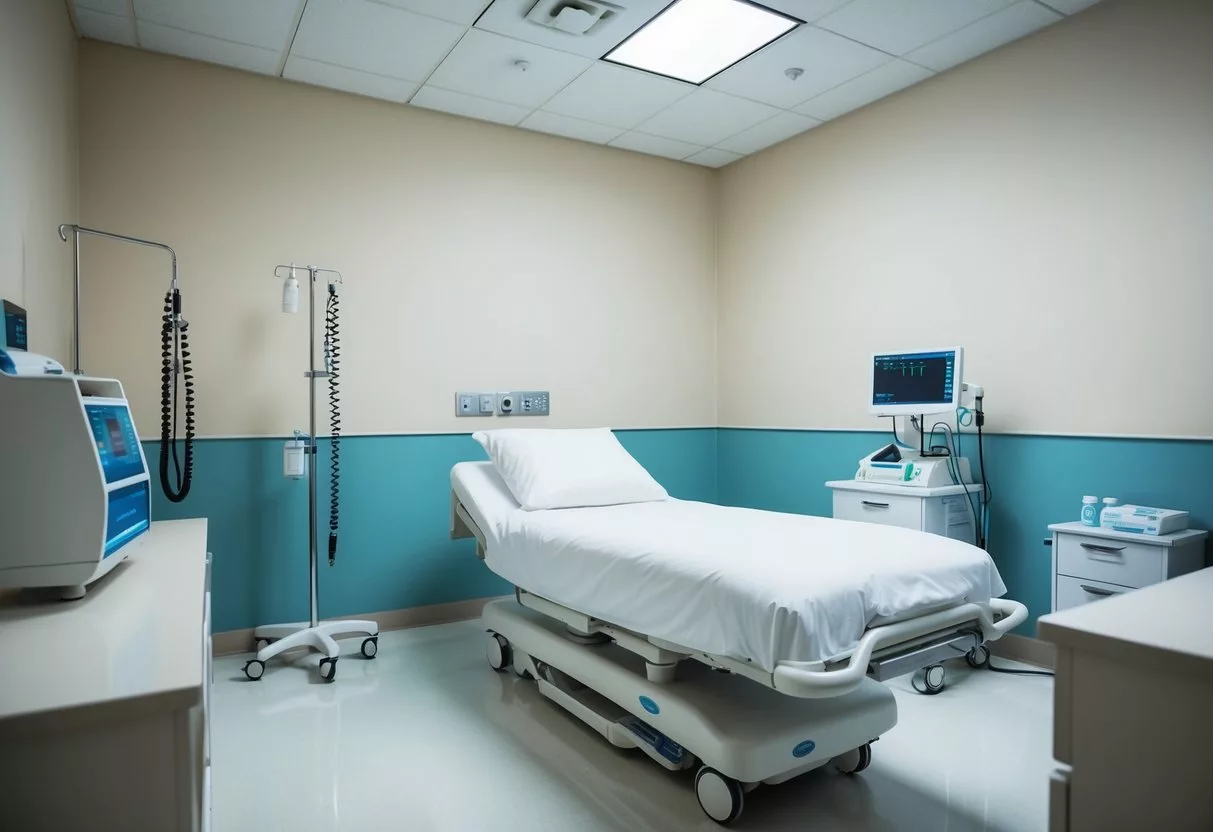Detox programs play a key role in helping people quit drugs or alcohol. These programs help the body get rid of harmful substances. They also prepare a person for further treatment.

Detox programs[1] use medical care and support to manage withdrawal symptoms safely. The detox process can be tough. It often causes physical and mental discomfort. But with the right help, people can get through it.
There are different types of detox programs. Some take place in hospitals. Others happen at special rehab centers. The best choice depends on a person’s needs.
After detox, many people move on to other forms of treatment. This helps them stay substance-free in the long term.
Understanding Detoxification

Detoxification is a fundamental process in addiction recovery. It involves removing harmful substances from the body and managing withdrawal symptoms. The process can be challenging but is an important first step toward healing.
The Science of Detox
Detoxification[2] is the body’s natural way of eliminating toxins. When someone stops using drugs or alcohol, their body begins to clear out these substances. This process can cause withdrawal symptoms.
The liver plays a key role in detox. It breaks down toxins into less harmful compounds. The kidneys then filter these compounds out of the blood.
Detox can affect brain chemistry. As the body adjusts to the absence of drugs or alcohol, neurotransmitter levels may change. This can lead to mood swings and cravings.
Types of Substances and Associated Withdrawal Symptoms
Different substances cause varied withdrawal symptoms. Alcohol withdrawal[1] can be severe and may include anxiety, tremors, and in some cases, seizures.
Opioid withdrawal often causes flu-like symptoms. These may include body aches, nausea, and sweating.
Stimulant withdrawal can lead to fatigue, depression, and increased appetite.
Withdrawal symptoms[3] usually start within 6-24 hours after the last use. They can last for several days or even weeks.
Detox programs help manage these symptoms safely. Medical supervision is often necessary, especially for alcohol and benzodiazepine withdrawal.
Assessment and Evaluation

The assessment and evaluation process is crucial for creating an effective detox program. It helps determine the right level of care and identifies any medical or mental health needs.
Determining the Level of Care
A comprehensive assessment[4] is key to deciding the best treatment approach. Trained professionals use standardized tools to evaluate the severity of substance use disorder.
They look at drug and alcohol use patterns, frequency, and amounts. The assessment also covers past treatment attempts and their outcomes.
Family history, social support, and living situation are important factors. These help determine if inpatient or outpatient care is more suitable.
The goal is to match the person with the right level of care for their unique needs.
Medical and Psychological Screening
Medical screening checks for health issues related to substance use. This includes liver function tests, blood work, and screening for infectious diseases.
A thorough mental health evaluation[5] is essential. It helps identify co-occurring disorders like depression or anxiety.
Professionals use interviews and questionnaires to assess psychological state. They look for signs of trauma, mood disorders, or other mental health concerns.
This screening helps create a treatment plan that addresses both substance use and mental health needs. It ensures a more holistic approach to recovery.
Detox Program Options

Detox programs come in various forms to suit different needs and situations. They range from inpatient to outpatient options and may include specialized facilities or medical assistance.
Inpatient vs. Outpatient Detox
Inpatient detox[6] involves staying at a facility 24/7 during the detox process. This option provides round-the-clock care and support. It’s best for those with severe addictions or health issues.
Outpatient detox allows patients to live at home while attending treatment during the day. It’s more flexible and often cheaper than inpatient care. This option works well for people with milder addictions and strong support systems.
Both types offer medical supervision and counseling. The choice depends on the person’s needs, addiction severity, and lifestyle.
Specialized Detox Facilities
Some detox centers focus on specific groups or addictions. For example, there are programs for:
- LGBTQ individuals
- Young adults
- Specific substances (alcohol, opioids, etc.)
These facilities tailor their approach to address unique challenges faced by certain groups. They may offer targeted therapies or create a more comfortable environment for patients.
Specialized programs[6] can lead to better outcomes. Patients often feel more understood and supported in these settings.
Medically Assisted Detox Programs
Medically assisted detox[7] uses medications to manage withdrawal symptoms. This approach makes the detox process safer and more comfortable.
Common medications used include:
- Methadone for opioid addiction
- Benzodiazepines for alcohol withdrawal
- Buprenorphine for opioid detox
These programs offer 24/7 medical monitoring. They can quickly address any complications that arise during withdrawal.
Medically assisted detox is often recommended for severe addictions. It’s also useful for those with co-occurring health issues.
Medical Care During Detox

Medical care is crucial during detox to keep patients safe and comfortable. Doctors use medications to manage withdrawal symptoms and treat underlying health issues. They also monitor patients closely for any complications.
Managing Withdrawal Symptoms
Detox can cause many unpleasant symptoms. Doctors work to ease these symptoms and prevent serious problems.
They check vital signs like heart rate and blood pressure often. Patients may get fluids through an IV to stay hydrated.
For alcohol detox, doctors watch for delirium tremens[8]. This dangerous condition can cause confusion, fever, and seizures. Quick treatment is essential.
Opioid withdrawal is very uncomfortable but rarely life-threatening. Still, medical care helps patients get through it more easily. Doctors can give medications to reduce nausea, diarrhea, and other symptoms.
Medications Used in Detox
Certain medications make detox safer and more comfortable.
For alcohol detox, benzodiazepines[9] help prevent seizures and ease anxiety. Doctors carefully control the dose to avoid dependence.
For opioid detox, buprenorphine[9] reduces cravings and withdrawal symptoms. It allows for a more gradual taper off opioids. Naltrexone may be used later to prevent relapse.
Other medications treat specific symptoms:
- Anti-nausea drugs
- Pain relievers
- Sleep aids
- Antidepressants
Doctors also treat any other medical conditions during detox. This might include giving medications for high blood pressure, diabetes, or infections.
Psychological Support and Counseling

Detox programs often include mental health support to help patients cope with emotional challenges. This support addresses anxiety, depression, and other behavioral health issues that may arise during recovery.
Therapeutic Interventions
Counseling is a key part of detox programs. Trained therapists help patients work through their feelings and build coping skills.
Common types of therapy include:
- Cognitive-behavioral therapy
- Motivational interviewing
- Group therapy sessions
These approaches help patients understand their substance use triggers and develop healthier ways to deal with stress.
Therapists may also treat co-occurring mental health issues like anxiety or depression.
Patients learn to identify negative thought patterns and replace them with more positive ones. This helps reduce cravings and prevents relapse.
Regular one-on-one sessions allow for personalized care and support.
Building a Support System
A strong support system is vital for long-term recovery. Detox programs help patients connect with others who understand their struggles.
This may include:
- Peer support groups
- Family therapy sessions
- Alumni programs
These connections provide emotional support and practical advice. Patients learn they’re not alone in their journey. They can share experiences and coping strategies with others.
Family involvement can improve treatment outcomes. Loved ones learn how to support the patient’s recovery. They also address any family issues that may have contributed to substance use.
Support groups[10] offer ongoing help after detox ends. This keeps patients engaged in their recovery process. It also provides a safe space to discuss challenges and celebrate successes.
Continuing Care and Treatment Planning

Continuing care is crucial for long-term recovery from addiction. It involves creating a plan to prevent relapse and maintain sobriety after completing a detox program.
Developing a Long-Term Treatment Plan
A long-term treatment plan is key to ongoing recovery. It outlines goals and strategies for staying sober. The plan often includes:
- Regular therapy sessions
- Support group meetings
- Medication management (if needed)
- Life skills training
Treatment plans are personalized. They take into account each person’s unique needs and challenges. Plans may involve partial hospitalization[11] for more intensive support.
Regular check-ins help adjust the plan as needed. This ensures it stays effective over time.
Relapse Prevention Strategies
Relapse prevention is a critical part of continuing care. It helps people avoid returning to substance use.
Common strategies include:
- Identifying triggers
- Developing coping skills
- Building a strong support network
- Practicing stress management techniques
Aftercare programs[12] often focus on these skills. They may include group therapy, one-on-one counseling, or both.
Some people benefit from medication to reduce cravings. Others find 12-step programs helpful for ongoing support.
Learning to recognize warning signs of relapse is important. This allows for early intervention if needed.
Integrating Mental and Physical Healthcare

Mental and physical health are closely connected. Treating both together leads to better results. This approach helps people get the care they need for all their health issues.
Co-Occurring Mental Health Conditions
Many people in detox programs have both mental illness and substance use disorders[13]. This is called having co-occurring conditions. It’s important to treat these issues at the same time.
Integrated care can help in several ways:
- Doctors and therapists work as a team
- Patients get all their treatments in one place
- Medications for mental health and addiction are managed together
This approach can lead to better outcomes. Patients are more likely to stick with treatment when all their needs are met.
Focus on Physical Health
People with mental health issues often have physical health problems too[14]. Integrated care pays attention to both.
Some ways to focus on physical health include:
- Regular health check-ups
- Help managing chronic illnesses
- Exercise programs
- Nutrition advice
Taking care of physical health can improve mental health. It can also help prevent future health issues.
Mobile health clinics[15] are one way to bring care to people who need it. These clinics can offer both mental and physical health services in one place.
Methods and Approaches to Detox

Detox programs use different techniques to help people stop using drugs safely. Some focus on medical care, while others use natural methods. The speed of detox can also vary.
Traditional vs. Alternative Detox Methods
Medical detoxification programs[16] use medications to manage withdrawal symptoms. Doctors monitor patients and give drugs to ease discomfort. This method is often used for alcohol, benzos, and opioids.
Natural detox avoids medications. It relies on the body’s ability to cleanse itself. This can be done at home or in a supervised setting. It may include diet changes, exercise, and rest.
Outpatient detox[17] lets people live at home while getting treatment. They visit a clinic regularly for check-ups and support. This works best for milder addictions.
Inpatient detox provides 24/7 care in a hospital or rehab center. It’s safer for severe addictions or when medical issues are present.
Rapid and Ultra-Rapid Detox
Rapid detox aims to speed up the withdrawal process. It usually takes 3-5 days. Patients get medications to reduce symptoms. They’re closely watched by medical staff.
Ultra-rapid detox is even faster, often done in 24-48 hours. Patients are put under anesthesia. Doctors give drugs to flush out toxins quickly. This method is controversial due to risks.
Both rapid methods try to make detox easier and faster. But they can be dangerous and are not right for everyone. The detox process and stabilization are key parts of both approaches.
Aftercare and Recovery

Aftercare plans are vital for maintaining sobriety after detox. They help people stay on track and prevent relapse. These plans often include ongoing support and lifestyle changes.
Integration into Addiction Treatment
Aftercare programs[18] are a key part of addiction treatment. They start right after detox ends. These programs help people move from intense treatment to daily life.
Common aftercare options include:
- 12-Step programs
- Outpatient care
- One-on-one counseling
- Group therapy
Many rehabs offer alumni programs[19] for ongoing support. These keep people connected to their treatment center. They also provide a network of sober peers.
Aftercare plans are tailored to each person’s needs. They may change over time as recovery progresses. The goal is to build skills for long-term sobriety.
Lifestyle Changes and Recovery Maintenance
Maintaining recovery requires big lifestyle shifts. People in recovery need to build new, healthy habits. This helps them avoid triggers and cope with stress.
Key lifestyle changes often include:
- Regular exercise
- Healthy eating habits
- Better sleep routines
- New hobbies and interests
Sober living homes[20] can help with these changes. They offer a structured, drug-free environment. Residents learn to balance work, recovery, and social life.
Ongoing therapy is also crucial. It helps people deal with underlying issues. This can prevent relapse in tough times. Many find that joining support groups aids long-term recovery too.
Resources and Support
Getting help for addiction involves finding the right treatment center and accessing supportive resources. There are many options available to assist those seeking recovery.
Finding the Right Treatment Center
Treatment locators[10] can help find nearby rehab centers. These tools allow searching by location, treatment type, and payment options. It’s important to look for centers that offer evidence-based programs tailored to individual needs.
When choosing a facility, consider factors like:
• Accreditation and licensing • Types of therapy offered • Staff credentials • Length of programs • Aftercare support
Many rehab centers[21] provide both inpatient and outpatient care. Inpatient programs offer 24/7 support in a structured environment. Outpatient programs allow people to live at home while attending treatment.
National and Community Resources
SAMHSA[22] offers a national helpline providing referrals and information. This free, confidential service is available 24/7 in English and Spanish.
Local support groups like Alcoholics Anonymous and SMART Recovery[23] offer peer support. These groups help build a sober network.
Community health centers often provide low-cost counseling and treatment options. Many areas have sober living homes to support long-term recovery.
Online forums and mobile apps can offer additional support between therapy sessions. These tools help people stay connected to their recovery goals.
Frequently Asked Questions
Detox programs raise many common questions about their effectiveness, duration, benefits, methods, and potential risks. People often want to know what to expect during the process.
What constitutes an effective detoxification strategy?
An effective detox strategy focuses on safely managing withdrawal symptoms[24] as a person stops using drugs or alcohol. It includes medical supervision and support to protect physical and mental health. Good detox programs offer both inpatient and outpatient options.
They tailor treatment to each person’s needs. Effective detox also prepares someone for further addiction treatment after the initial withdrawal period.
Can you explain the duration required for a typical detox regimen?
The length of detox varies based on the substance used and the person’s health. Most detox programs last 3-7 days, but some may take up to 2 weeks.
Alcohol detox often takes 5-7 days. Opioid detox may last 5-10 days. The exact timeline depends on factors like usage history and any medical issues.
What are the scientifically supported benefits of detox programs?
Detox programs help manage withdrawal symptoms safely[25]. They reduce the risk of dangerous complications during withdrawal. Medical supervision ensures comfort and safety.
Detox can stabilize a person’s health. It allows the body to clear out toxins. This prepares someone for further addiction treatment with a clear mind.
How do detox programs vary and what are the different methods available?
Detox programs include inpatient and outpatient options. Inpatient provides 24/7 care in a hospital or treatment center. Outpatient allows people to visit a clinic for treatment.
Methods vary by substance. Some use medications to ease symptoms. Others focus on supportive care. Holistic approaches may include nutrition and alternative therapies.
What should one expect during the process of a detox program?
During detox, withdrawal symptoms[1] may occur. These can include anxiety, nausea, and body aches. Medical staff monitor vital signs and provide treatment as needed.
Patients receive support and comfort measures. They may take medications to manage specific symptoms. The intensity of symptoms often peaks within the first few days.
Are there any potential risks associated with detox programs?
Detox can involve risks, especially if done without proper medical care.
Severe withdrawal from alcohol or benzodiazepines can be life-threatening. Dehydration and electrolyte imbalances may occur.
Some people experience intense cravings or mood swings. Medical supervision helps manage these risks and keeps patients safe.
References
- Alcohol Detox and Rehab Programs: What to Expect and How to Choose. https://www.webmd.com/mental-health/addiction/alcohol-detox-programs Accessed October 23, 2025
- The Ultimate Guide to Understanding Detoxification. https://www.townsendla.com/blog/what-is-detox Accessed October 23, 2025
- Alcohol Detox: First Step to Recovery. https://americanaddictioncenters.org/alcohol/detox Accessed October 23, 2025
- Screening and Assessment Tools Chart. https://www.samhsa.gov/resource/dbhis/screening-assessment-tools-chart Accessed October 23, 2025
- Alcohol and substance recovery. https://www.healthpartners.com/care/specialty/mental-behavioral-health/alcohol-and-substance-use-treatment/ Accessed October 23, 2025
- Outpatient Drug & Alcohol Detox Centers Near You. https://americanaddictioncenters.org/rehab-guide/outpatient-treatment/detox Accessed October 23, 2025
- How to Detox From Drugs or Alcohol. https://www.addictiongroup.org/treatment/detox/drug-alcohol/ Accessed October 23, 2025
- 403 Forbidden. https://www.hazeldenbettyford.org/rehab-treatment/detox Accessed October 23, 2025
- Medical Detox from Drugs or Alcohol: When is it Needed and Why?. https://www.therecoveryvillage.com/treatment-program/medical-detox/ Accessed October 23, 2025
- Find Help and Treatment for Mental Health, Drug, Alcohol Issues. https://www.samhsa.gov/find-help Accessed October 23, 2025
- Addiction Services - Continuing care recovery group programs. https://www.mayoclinic.org/departments-centers/addiction-services/sections/continuing-care-recovery-group-programs/gnc-20560256 Accessed October 23, 2025
- Aftercare Programs for Addiction Recovery. https://recovery.org/drug-treatment/aftercare/ Accessed October 23, 2025
- Just a moment.... https://journals.sagepub.com/doi/full/10.1177/23992026211050615 Accessed October 23, 2025
- Physical & Mental Health Integration. https://www.nami.org/Advocacy/Policy-Priorities/Improving-Health/Physical-Mental-Health-Integration/ Accessed October 23, 2025
- Just a moment.... https://www.healthaffairs.org/doi/10.1377/hlthaff.2020.01472 Accessed October 23, 2025
- Drug Detox Types: Natural & Medical Detoxification. https://drugabuse.com/treatment/levels-of-care/detox/types/ Accessed October 23, 2025
- Alcohol & Drug Detox Programs In Massachusetts. https://bedrockrecoverycenter.com/articles/detox-approaches/ Accessed October 23, 2025
- Addiction Recovery & Aftercare: Programs, Activities & Support Groups. https://americanaddictioncenters.org/rehab-guide/aftercare Accessed October 23, 2025
- Aftercare Plan: How to Sustain Recovery When Rehab Ends. https://detox.net/aftercare/ Accessed October 23, 2025
- Life After Rehab: About Aftercare and Sober Living Programs. https://www.therecoveryvillage.com/treatment-program/aftercare/ Accessed October 23, 2025
- FindTreatment.gov. https://findtreatment.gov/locator Accessed October 23, 2025
- Home | SAMHSA. https://www.samhsa.gov/ Accessed October 23, 2025
- Home. https://www.smartrecovery.org/ Accessed October 23, 2025
- Drug and Alcohol Detox: Benefits, Steps, and Withdrawal Symptoms. https://startyourrecovery.org/treatment/detox Accessed October 23, 2025
- Drug Detox: Process, Side Effects & Detox Centers Near Me. https://americanaddictioncenters.org/drug-detox Accessed October 23, 2025
